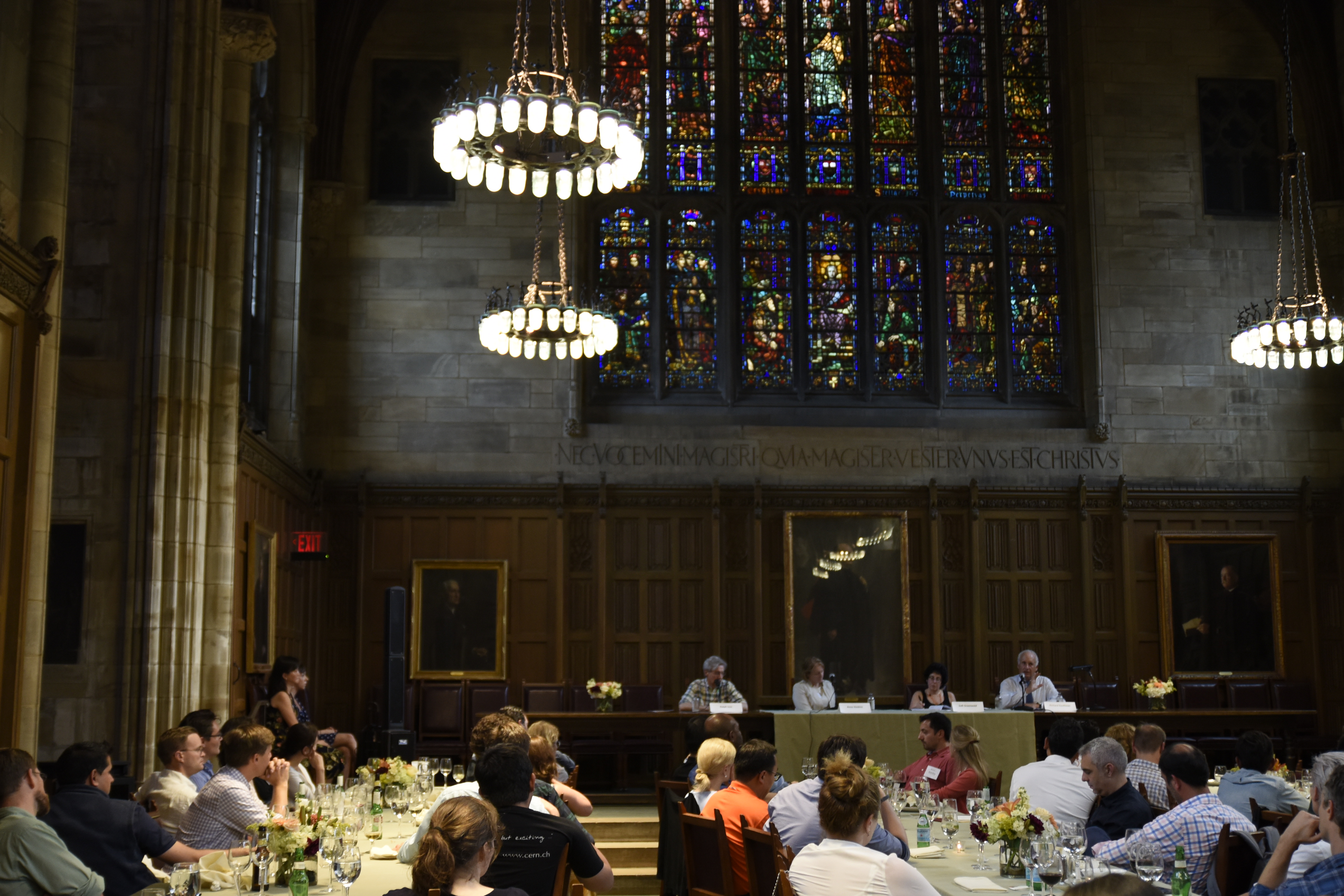By Molly A. Seltzer
A team of three company founders and two investors were working to cheaply cool a tent in a courtyard of the Andlinger Center for Energy and the Environment when Sofana Dahlan proposed using a traditional solution from her home in Saudi Arabia.

“I immediately recalled stories from my grandmother about how she hung wet bedsheets on the rooftop,” said Dahlan, who recently served as Saudi Arabia’s first female senior economic policymaker. The group enthusiastically dunked cloths in ice water baths and stapled them to the inside to cool the makeshift structure.
Dahlan’s group was among six teams participating in Princeton’s four-day executive education module July 15-18. The program was designed for the Young Global Leaders, an international group of individuals selected by the World Economic Forum for making meaningful change in their communities.
The 30 participants were executives, entrepreneurs, government officials and scientists from 22 countries.
In selecting participants for the educational program, the World Economic Forum focused on leaders who demonstrated interest in global energy and environmental issues. The Andlinger Center’s goal was to equip them with information to make responsible and sustainable decisions for their organizations. The module provided them the opportunity to discuss the challenges of and possible solutions to increasing global resource demands and a changing climate.
“The Andlinger Center provided key information on energy and environmental issues and set aside time for these individuals to think critically about how they impact their organizations,” said Yueh-Lin (Lynn) Loo, director of the Andlinger Center and the Theodora D. ’78 and William H. Walton III ’74 Professor in Engineering. “Educating this group of crucial stakeholders will ultimately help secure the global energy and environmental future.”
In his address welcoming participants, University President Christopher L. Eisgruber echoed the importance of engagement and partnership on a University-wide level.
“We all benefit when university research translates across sectors,” he said. “These kinds of partnerships drive economic progress and prosperity, and thereby help to create the conditions for democracy and freedom.”
The module was the first executive education program offered by Princeton, and the first time the University partnered with the World Economic Forum to educate the Young Global Leaders. The course focused on team exercises and also offered lectures, workshops and panel discussions.
In one activity, teams of participants learned about new technologies developed at the Andlinger Center, provided feedback to the inventors and presented the innovations to a panel of venture capitalists in a mock pitch competition.
The conference also covered the psychological and behavioral pieces of the climate issue in a lecture by Elke Weber, Princeton’s Gerhard R. Andlinger Professor of Energy and the Environment, psychology and public affairs, who is also associate director for education at the Andlinger Center. She and Amy Craft, an economist specializing in energy in the Woodrow Wilson School of Public and International Affairs, discussed why short-term or emotional judgments often override rational thought when it comes to sustainability and innovation decisions.
Later a panel of energy executives, including Ralph Izzo, the president of PSEG, Anne Hoskins, chief policy officer of Sunrun, and Richard Kauffman, New York State’s chair of energy and finance, delved into local energy policies, grid resilience and clean energy.

The conversation on energy turned to powering buildings in a lecture about thermal comfort by Forrest Meggers, assistant professor of architecture and the Andlinger Center. Meggers, co-director of the Program in Architecture and Engineering, spoke about designing buildings and engineering solutions that keep occupants, rather than the air inside buildings, cool.
Buildings, and specifically cooling, account for a large piece of global emissions and a significant rise in energy consumption in developing countries. In one talk, the group learned that coal consumption in Indonesia had increased by 24,000 percent in the last four decades, in large part due to increased access to air conditioning.
The groups then engaged in a hands-on challenge to come up with a low-cost solution to cool tents.
It was a perfect day for the challenge, as temperatures pushed past 100 degrees in the Andlinger Center courtyards. With assistance from graduate students who served as the technical leads and using supplies that included mylar, a solar panel, air conditioner and a battery, the teams quickly brainstormed different cooling strategies.
Once each group realized that the solar panel and battery could not provide enough energy to keep the air conditioner running, they quickly opted out of using the more conventional but costly and energy consumptive cooling strategy.
Taking a tip from Meggers, the groups focused on measures that cooled the participants rather than the space. They removed their shoes, moved the tents away from the hot walls of the courtyard, repositioned the tents over green areas, and created mists with water and fans. One group built a wall with aluminum-coated mylar to reflect the direct sun away from their tent.
Through the activity, the complex realities of resource and comfort management became strikingly clear: how comfort levels varied among participants in any given setting; how costly it is and how much energy it takes to cool spaces; and how difficult it is to work without thermal comfort.
“When people are out of their comfort zone, quite literally, they learn the most,” said participant Anthony Smaré, chairman of Papua New Guinea’s superannuation investment fund, Nambawan Super. “There was vulnerability in learning together outside in the heat of summer.”
Howard Cox, special limited partner of Greylock Partners and funder of the inaugural module, said that type of collaboration was the event’s main goal.
“When I look at where everyone has come from, we’ve truly assembled a world class group in terms of background and accolades,” said Cox, a graduate of the Woodrow Wilson School. “Collaboration in this room, among global leaders from NGOs, academia and business yields far-reaching impact. This is how we change the world.”
Loo said the program reflected the Andlinger Center’s mission of educating and bringing together stakeholders outside of the academic community to advance energy and environmental solutions.
“The Andlinger Center plays a unique role as a convener of business, government and all other parties that can forge progress in this arena,” said Loo, the center’s director and a 2012 Young Global Leader. “We all have a stake in a secure energy and environmental future, and the Andlinger Center is working to achieve that.”
For program participant Akira Kirton, managing director of BP Ventures for Europe and Asia, it was encouraging to get together with like-minded peers and talk about how to move forward on climate and energy.
“For me, the massive insight was to see how politicians, scientists, technologists, economists and engineers all collaborate to come up with better solutions to deliver against meaningful targets,” Kirton said. “As an individual I’ve been working in this area for over 15 years and at times I’ve felt optimistic, at times pessimistic. Overall, I now feel optimistic, which for me is a huge achievement.”